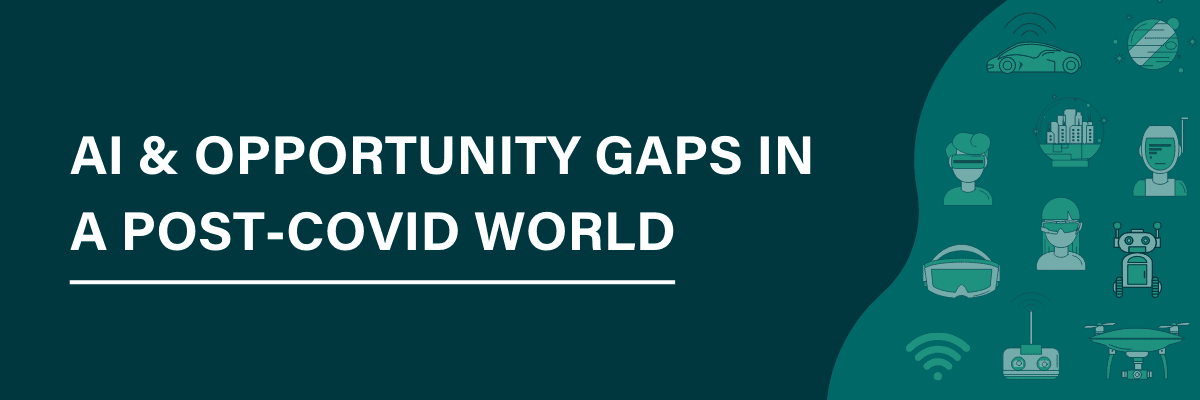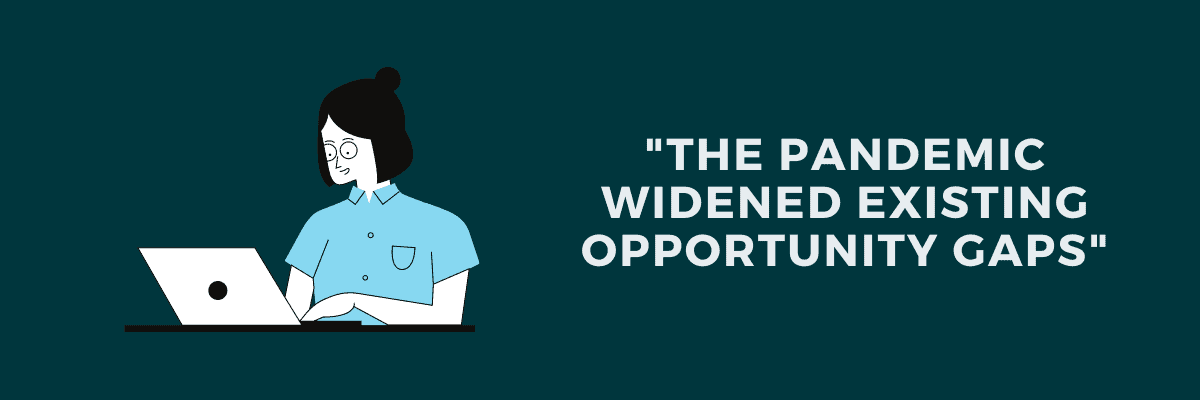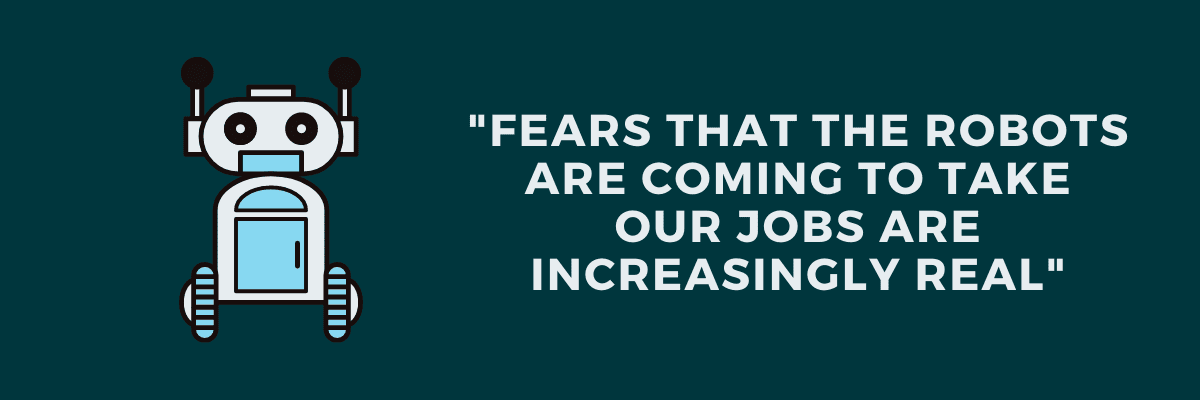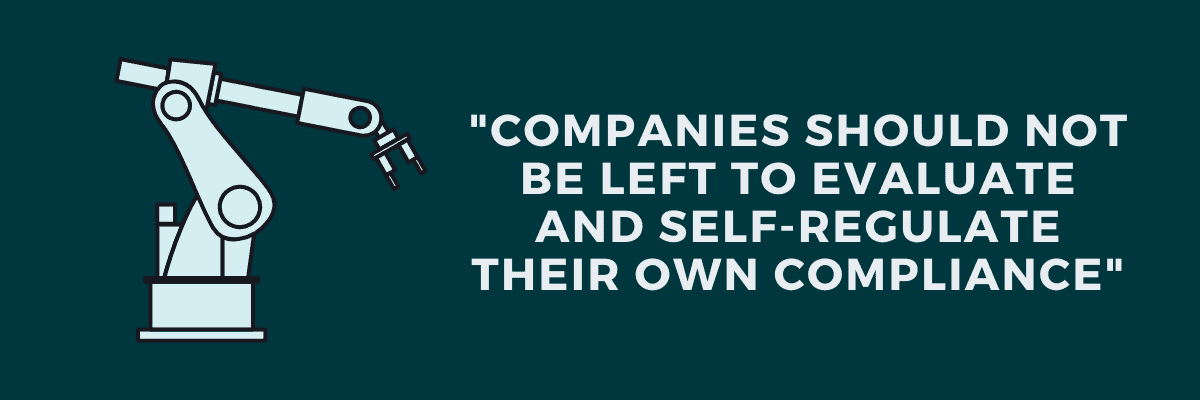

Together, we are all navigating an uncertain path toward economic recovery as governments around the world order lockdowns, re-openings, and sadly, rollbacks of re-openings. When the lockdown began in March here in Washington State, I was already contributing to a story on an AI skilling solution in my work with the business incubation team within the broader Microsoft AI Marketing team. The pandemic has accelerated the need for tech innovation, including AI solutions, to help reimagine the future of work and re-train and upskill workers for a post-COVID-19 world. I set out to learn and share how thought leaders are looking at these challenges.
The focus on AI as a powerful tool to address skills gaps predates the pandemic—in 2019 Bernard Marr, an author and AI tech influencer, wrote in Forbes, “from how we are recruited and on-boarded to how we go about on-the-job training, personal development, and eventually passing on our skills and experience to those who follow in our footsteps, AI technology will play an increasingly prominent role.”
Then—in just the first three months of the pandemic—US unemployment claims outpaced those filed during two years of the Great Recession, according to the Pew Research Center. The crisis has disproportionately affected women, Black men, Hispanics, immigrant workers, and those with lower levels of education. The report also found that those with college degrees were six times more likely to have the option to telecommute than workers without a high school diploma.
In other words, the pandemic widened existing opportunity gaps.
Microsoft President Brad Smith addressed these growing gaps in a June announcement of a global Microsoft worker skilling initiative that will include an AI-powered job interview preparation feature.
“The pandemic has shined a harsh light on what was already a widening skills gap around the world—a gap that will need to be closed with even greater urgency to accelerate economic recovery,” Smith wrote.
The first of the Microsoft partnerships, with the City of Atlanta, was also announced in July.
"Through Accelerate: Atlanta, Microsoft, and its partners will help close the digital divide and ensure there is a place for everyone in our shared future," said Atlanta Mayor Keisha Lance Bottoms. "The road to economic recovery must begin with pathways to opportunity that are inclusionary and accessible to all."
That same month, a consortium of tech companies led by Infosys announced an AI-based talent-matching platform “to meet the reskilling and employment needs raised by the COVID-19 crisis.”
To help local governments address gaps in opportunities, Smith also pledged that Microsoft would make data and analytics available to governments seeking to assess economic needs specific to their regions, as in the Atlanta partnership.

A May 2020 Deloitte Insights piece on the future of work observed: “COVID-19 showed people that while technology can augment and supplement work, it does not replace what is needed from humans. The health crisis gave people a greater appreciation for the fact that humans and technology are more powerful together than either can be on their own. Consider how telemedicine, manufacturing, education, and even grocery delivery drew on the power of integrated human-machine teams during the crisis.”
Examples include an IBM Watson-powered chatbot that helps public health workers reduce call wait-times, and robot assistants that help health care providers to safely care for the sickest COVID patients, while reducing the need for scarce personal protective equipment.
And yet, fears that the robots are coming to take our jobs are increasingly real.
As Erika Hayasaki details in the MIT Technology Review, employers now “have a clear incentive to replace more workers permanently” due to safety and liability concerns surfaced by the pandemic.
In the absence of job protection or reskilling, says Hayasaki, many essential roles in health care and other fields risk elimination. And while some workers will be able to retrain as “robot wranglers” who can do things that robots can’t, says Hayasaki, there will be fewer of those jobs.
Ai-Jen Poo, the co-founder and executive director of the National Domestic Workers’ Alliance, struck a hopeful note for lower-wage workers in a recent interview: “Think of how much has changed in the last five months, and how much we have survived, thanks to our essential workers. Let’s make sure that five years from now, their jobs, health, and wellbeing are as secure as they kept us.”
Many thought leaders agree that the government will need to play a leading role.
“The government is the only actor that really has the capacity to act on the scale that’s needed,” David Autor, Ford Professor of Economics at MIT, has said. “Let’s create a Marshall Plan for the US: Rebuild American infrastructure, invest in schools, and remake ourselves.”

The need for new legislation and regulation in AI tech is a hot-button issue. However, there is growing consensus among some leading tech companies that there need to be agreed-upon standards, and that companies should not be left to evaluate and self-regulate their own compliance.
As protesters gathered around the world to support Black Lives Matter, top tech companies including IBM, Microsoft, and Amazon announced plans to permanently discontinue or suspend sales of facial recognition technology to police departments. Smith said Microsoft’s suspension of sales would continue in the US until “until we have a national law in place, grounded in human rights, that will govern this technology.” In a letter to members of Congress, IBM opposed use of any technology that violates basic human rights and freedoms.
To some degree, this thinking extends to their customers. According to a March 2020 O’Reilly enterprise AI adoption survey, 40% of companies in the evaluation phase ranked fairness, bias, and ethics as the second-highest risk factor. For businesses with more mature AI implementations, the same risk ranked third, with 48% reporting that they already check for fairness and bias during model building and deployment.
Facebook announced plans to set up its own “internal teams” to examine racial bias in its Facebook and Instagram algorithms. As many journalists—including Kara Swisher, in her New York Times columns and Pivot podcast—have documented, the company has served as a model for why regulation is needed.
In January, IBM had already announced IBM Policy Lab, which advocates for “precision regulation” of AI “based on accountability, transparency, fairness, and security,” along with the appointment of AI ethics officials to act as watchdogs.

Academic researchers, including Joy Buolamwini, Timnit Gebru, and Inioluway Deborah (Deb) Raji, are receiving attention for their groundbreaking work to push tech companies to reduce racial and gender bias in AI. In their study, the AI tech of leading companies failed to accurately classify iconic Black women such as Oprah Winfrey, Michelle Obama, and Serena Williams.
“As more people question how seemingly neutral technology has gone astray," Buolamwini said, “it’s becoming clear just how important it is to have broader representation in the design, development, deployment, and governance of AI.”
AI has the power to narrow—or exacerbate—the skills and opportunity gap. Narrowing the gap requires responsible and effective use of AI … and our collective attention. I encourage you to do your part.
Take whatever action you can to help narrow opportunity gaps, such as the network gap. Join the conversations around closing the skills gap and creating more equity in AI innovation. Follow and engage with thought leaders in the space, including those mentioned in this post.